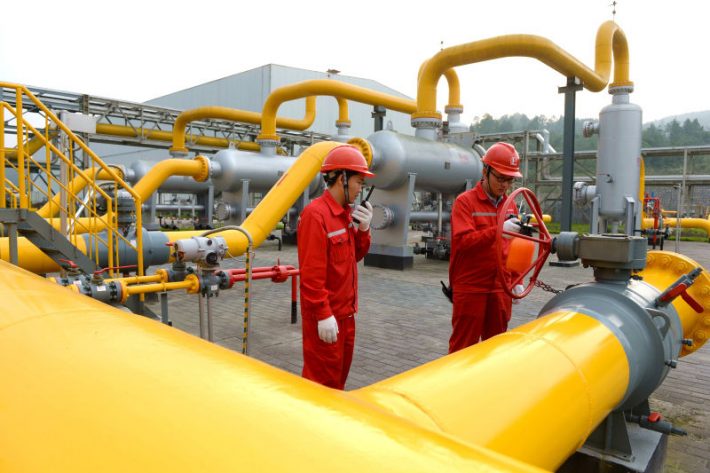The fossil fuel sector is on track to miss 2050 net-zero targets by a wide margin, according to an analysis of data from S&P Global’s Sustainable1 unit.
The S&P Global Trucost Paris Alignment data shows the 30 largest oil and gas companies in Europe and North America have a collective emissions trajectory consistent with a 5-degree Celsius rise in global temperatures by 2100, it said.
The data assumes that the rest of society will emit at the same rate as the company under examination.
ALSO SEE: Oil Nations Blocking COP29 Efforts on Fossil Fuel Phaseout – FT
Limiting the global temperature rise to less than 2 degrees C above pre-industrial levels — as called for in the Paris Agreement on climate change — will require reaching net-zero emissions by 2050, the report said.
ExxonMobil’s latest global energy outlook says the world is not on track to meet that goal. It claims that oil and natural gas will make up at least half of the world’s energy supply for the next few decades.
That outlook calls for crude oil demand to peak around 2030 but remain stable through to 2050.
ExxonMobil and BP have said that achieving their own 2050 net-zero goals is unlikely as well. BP began shifting out of green investments in 2023 in favour of renewed focus on producing crude oil and gas.
Big Oil pushing for carbon tax
But the oil and gas industry has a bad track record in predicting the pace of technological change, according to Andrew Logan, the senior director for climate and energy, oil and gas at Ceres, an organization that advocates for investor action for a sustainable economy.
“You even see it within the industry itself,” Logan said. “On something like hydraulic fracturing, Exxon was late to the game.”
Oil and gas companies are too pessimistic about global progress on emissions, Logan said.
“We have no choice, right?” he said. “We have to [reduce emissions], given all we know about the implications of a very high level of temperature rise. Global urgency will only increase as we see increased effects.”
The effort to get below 2 degrees Celsius “will require supportive policy, technology innovation, and market incentives to drive faster deployment of all available solutions,” ExxonMobil’s outlook said.
ExxonMobil’s has said for years that the best tool to reduce emissions is a tax on carbon. The largest trade oil and gas group in North America, the American Petroleum Institute, agreed with ExxonMobil that a carbon tax combined with technological advances will reduce emissions.
“The oil and natural gas industry is foundational to meeting that demand while reducing emissions,” an API spokesperson said in a statement.
“From [carbon capture, use and storage] and hydrogen to cleaner fuels and solutions to further reduce methane emissions, we are driving innovation toward a cleaner future while supporting smart government policies that build on industry progress underway.”
‘Stop drilling’
The best path to net-zero emissions for energy companies is to stop drilling and shift to other lines of work, said Matt Breidert, senior portfolio manager at Tortoise Capital’s sustainable investing unit Ecofin Advisors. Oil and gas drillers will keep producing and emitting until customers downstream force them to change, he said.
“Electrification eats everything, and electrification is the only way we can decarbonize,” Breidert said in an interview.
Utilities are already forging a path to net-zero, Breidert said, although they are not decarbonizing equally, so investors need to be stock pickers rather than index investors.
Power company NextEra Energy is the kind of firm that gets Ecofin’s investment dollar, he said. NextEra’s Paris alignment implies a 2 to 2.7C global temperature rise by 2100.
Breidert acknowledged that oil and gas companies have helped to reduce global carbon emissions by exporting LNG to replace coal overseas.
“The problem is there’s almost no accounting around how that works,” Breidert said. “If I mitigate methane emissions, that gives me a 38x multiplier — or whatever the number is that you want to use — for how intense methane is for [greenhouse gas emissions] versus CO2.
“That’s just monkey math, because at the end of the day, a lot of this methane is just new growth.”
The Carbon Tracker Initiative, a London think tank dedicated to examining the financial impacts of the energy transition, said oil and gas companies can still make significant contributions to emissions reductions and arrive at the net-zero milestone by 2050 in line with the Paris accords.
Change in business models needed
But to do so in such a short time, investors will need to increase pressure on oil and gas companies to make significant changes to their business models, according to Mike Coffin, who leads Carbon Tracker’s oil, gas and mining research team.
Investor pressure combined with national policies will help reduce the burning of fossil fuels, Coffin said.
The risk for investors in oil and gas companies will be that capital and assets — leases, rigs, pipelines — will be stranded as society cuts back on fossil fuel use, he said.
ExxonMobil, for one, is not putting up a “closed for business” sign. The company has sanctioned large offshore developments in Guyana, for instance, to feed fossil fuel use for decades.
“As these companies continue to invest heavily into new production, particularly new long-cycle developments exposed to commodity prices for decades to come, investors must really question the wisdom of such investments and actually whether the companies are protecting shareholder value through this,” Coffin said.
- Jim Pollard
NOTE: Several links were added to this report on Sept 18, 2024.
























